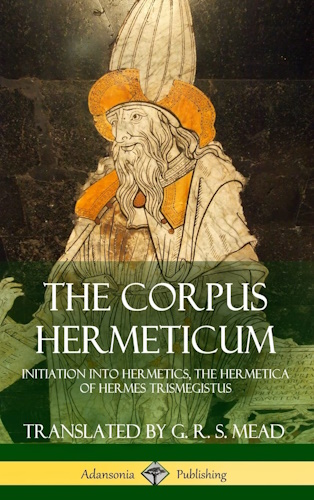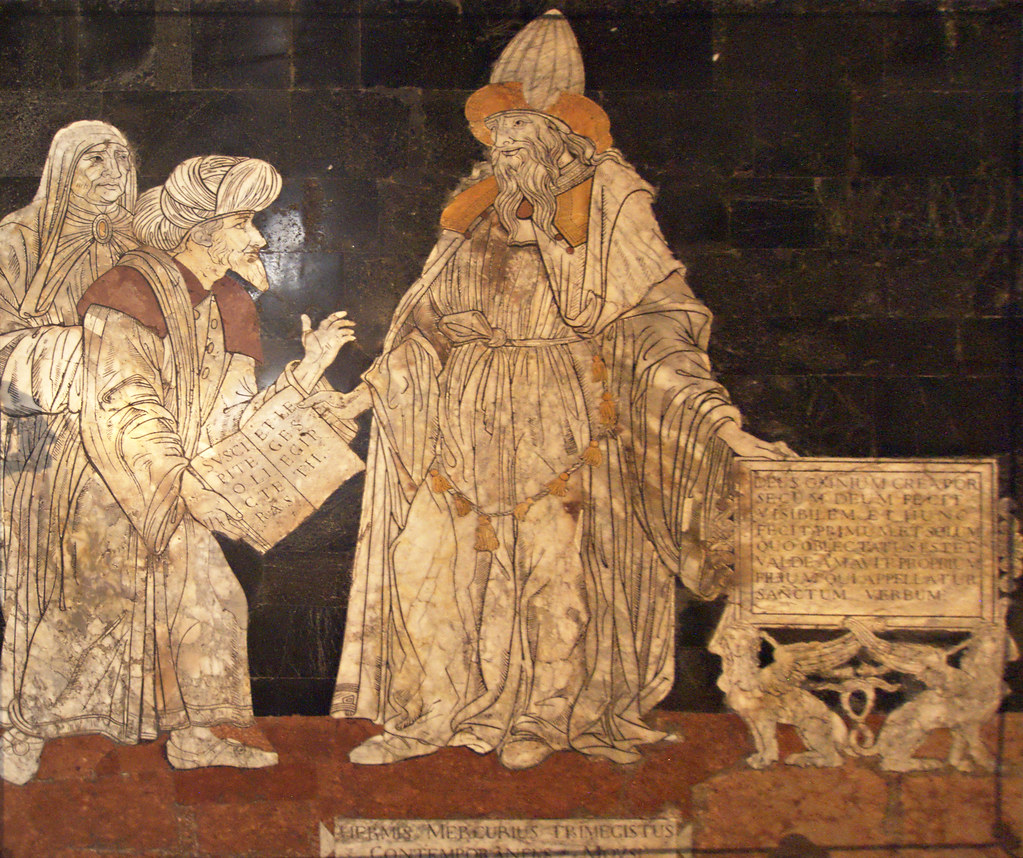
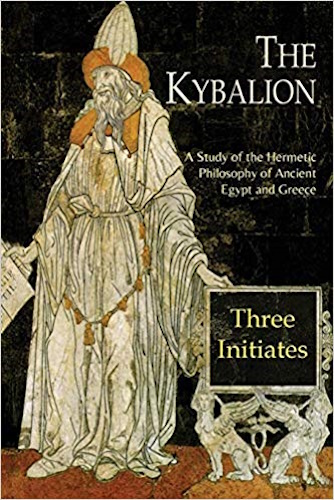

![Thrice-Greatest Hermes; Studies in Hellenistic Theosophy and Gnosis [Three Volumes in One] Thrice-Greatest Hermes; Studies in Hellenistic Theosophy and Gnosis [Three Volumes in One]](http://realityroars.com/images/affiliate-creative/thrice-greatest-hermes--studies-in-hellenistic-theosophy-and-gnosis.jpg)

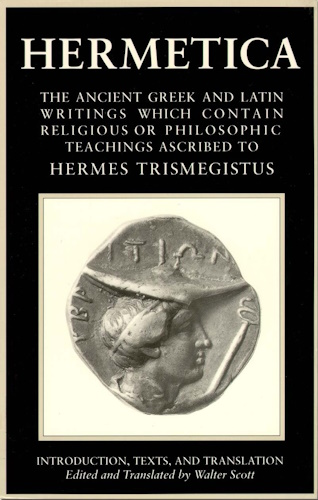



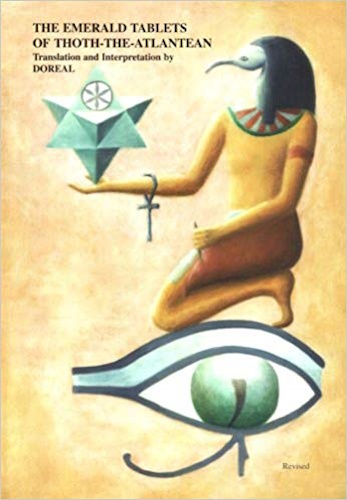

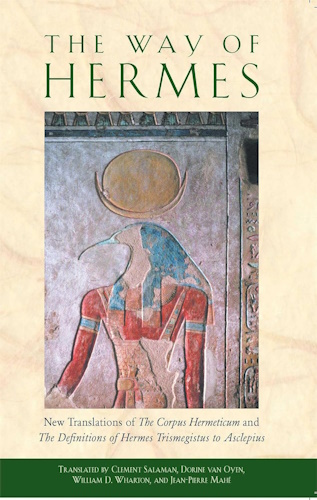

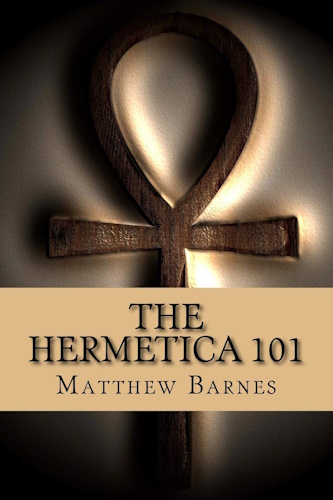

![]()
![]()
XIII. The Secret Sermon on the Mountain
<This dialogue is in many ways the culmination of the whole Corpus, summing up the theory of the Hermetic system at the same time as it provides an intriguing glimpse at the practice. The focus of the dialogue is the experience of Rebirth, which involves the replacement of twelve Tormentors within the self by ten divine Powers, leading to the awakening of knowledge of the self and God.
The "Secret Hymnody" (sections 17-20) is presented as a litany for worship, to be performed twice each day, at sunrise and sunset. It's interesting to note that while the sunrise worship is performed facing east, the sunset worship is done to the south; Egyptian tradition from Pharaonic times onward saw the west as the direction of death.
The usual difficulties with the multiple meanings of the Greek word logos appear in the translation, compounded by Mead's awkward style. Additionally, one of Mead's few evasions can be found in section 12, where he relates the twelve Tormentors to the "twelve types-of-life". This should more simply, and more accurately, have been translated as "the twelve signs of the Zodiac". The Theosophical distaste for astrology may well have been involved here. - JMG>
1. Tat: [Now] in the General Sermons, father, thou didst speak in riddles most unclear, conversing on Divinity; and when thou saidst no man could e'er be saved before Rebirth, thy meaning thou didst hide.
Further, when I became thy Suppliant, in Wending up the Mount, after thou hadst conversed with me, and when I longed to learn the Sermon (Logos) on Rebirth (for this beyond all other things is just the thing I know not), thou saidst, that thou wouldst give it me - "when thou shalt have become a stranger to the world".
Wherefore I got me ready and made the thought in me a stranger to the world-illusion.
And now do thou fill up the things that fall short in me with what thou saidst would give me the tradition of Rebirth, setting it forth in speech or in the secret way.
I know not, O Thrice-greatest one, from out what matter and what womb Man comes to birth, or of what seed.
2. Hermes: Wisdom that understands in silence [such is the matter and the womb from out which Man is born], and the True Good the seed.
Tat: Who is the sower, father? For I am altogether at a loss.
Hermes: It is the Will of God, my son.
Tat: And of what kind is he that is begotten, father? For I have no share of that essence in me, which doth transcend the senses. The one that is begot will be another one from God, God's Son?
Hermes: All in all, out of all powers composed.
Tat: Thou tellest me a riddle, father, and dost not speak as father unto son.
Hermes: This Race, my son, is never taught; but when He willeth it, its memory is restored by God.
3. Tat: Thou sayest things impossible, O father, things that are forced. Hence answers would I have direct unto these things. Am I a son strange to my father's race?
Keep it not, father, back from me. I am a true-born son; explain to me the manner of Rebirth.
Hermes: What may I say, my son? I can but tell thee this. Whene'er I see within myself the Simple Vision brought to birth out of God's mercy, I have passed through myself into a Body that can never die. And now i am not as I was before; but I am born in Mind.
The way to do this is not taught, and it cannot be seen by the compounded element by means of which thou seest.
Yea, I have had my former composed form dismembered for me. I am no longer touched, but I have touch; I have dimension too; and [yet] am I a stranger to them now.
Thou seest me with eyes, my son; but what I am thou dost not understand [even] with fullest strain of body and of sight.
4. Tat: Into fierce frenzy and mind-fury hast thou plunged me, father, for now no longer do I see myself.
Hermes: I would, my son, that thou hadst e'en passed right through thyself, as they who dream in sleep yet sleepless.
Tat: Tell me this too! Who is the author of Rebirth?
Hermes: The Son of God, the One Man, by God's Will.
5. Tat: Now hast thou brought me, father, unto pure stupefaction. Arrested from the senses which I had before,…<lacuna in original text>; for [now] I see thy Greatness identical with thy distinctive form.
Hermes: Even in this thou art untrue; the mortal form doth change with every day. 'Tis turned by time to growth and waning, as being an untrue thing.
6. Tat: What then is true, Thrice-greatest One?
Hermes: That which is never troubled, son, which cannot be defined; that which no color hath, nor any figure, which is not turned, which hath no garment, which giveth light; that which is comprehensible unto itself [alone], which doth not suffer change; that which no body can contain.
Tat: In very truth I lose my reason, father. Just when I thought to be made wise by thee, I find the senses of this mind of mine blocked up.
Hermes: Thus is it, son: That which is upward borne like fire, yet is borne down like earth, that which is moist like water, yet blows like air, how shalt thou this perceive with sense - the that which is not solid nor yet moist, which naught can bind or loose, of which in power and energy alone can man have any notion - and even then it wants a man who can perceive the Way of Birth in God?
7. Tat: I am incapable of this, O father, then?
Hermes: Nay, God forbid, my son! Withdraw into thyself, and it will come; will, and it comes to pass; throw out of work the body's senses, and thy Divinity shall come to birth; purge from thyself the brutish torments - things of matter.
Tat: I have tormentors then in me, O father?
Hermes: Ay, no few, my son; nay, fearful ones and manifold.
Tat: I do not know them, father.
Hermes: Torment the first is this Not-knowing, son; the second one is Grief; the third, Intemperance; the fourth, Concupiscence; the fifth, Unrighteousness; the sixth is Avarice; the seventh, Error; the eighth is Envy; the ninth, Guile; the tenth is Anger; eleventh, Rashness; the twelfth is Malice.
These are in number twelve; but under them are many more, my son; and creeping through the prison of the body they force the man that's placed therein to suffer in his senses. But they depart (though not all at once) from him who hath been taken pity on by God; and this it is which constitutes the manner of Rebirth. And… <lacuna in the original text> the Reason (Logos).
8. And now, my son, be still and solemn silence keep! Thus shall the mercy that flows on us from God not cease.
Henceforth rejoice, O son, for by the Powers of God thou art being purified for the articulation of the Reason (Logos).
Gnosis of God hath come to us, and when this comes, my son, Not-knowing is cast out.
Gnosis of Joy hath come to us, and on its coming, son, Sorrow will flee away to them who give it room. The Power that follows Joy do I invoke, thy Self-control. O Power most sweet! Let us most gladly bid it welcome, son! How with its coming doth it chase Intemperance away!
9. Now fourth, on Continence I call, the Power against Desire. <lacuna in the original text> This step, my son, is Righteousness' firm seat. For without judgement <other translators read this "without effort"> see how she hath chased Unrighteousness away. We are made righteous, son, by the departure of Unrighteousness.
Power sixth I call to us - that against Avarice, Sharing-with-all.
And now that Avarice is gone, I call on Truth. And Error flees, and Truth is with us.
See how [the measure of] the Good is full, my son, upon Truth's coming. For Envy is gone from us; and unto Truth is joined the Good as well, with Life and Light.
And now no more doth any torment of the Darkness venture nigh, but vanquished [all] have fled with whirring wings.
10. Thou knowest [now], my son, the manner of Rebirth. And when the Ten is come, my son, that driveth out the Twelve, the Birth in understanding <literally "intellectual birth", noera genesis> is complete, and by this birth we are made into Gods.
Who then doth by His mercy gain this Birth in God, abandoning the body's senses, knows himself [to be of Light and Life] and that he doth consist of these, and [thus] is filled with bliss.
11. Tat: By God made steadfast, father, no longer with the sight my eyes afford I look on things, but with the energy the Mind doth give me through the Powers.
In Heaven am I, in earth, in water, air; I am in animals, in plants; I'm in the womb, before the womb, after the womb; I'm everywhere!
But further tell me this: How are the torments of the Darkness, when they are twelve in number, driven out by the ten Powers? What is the way of it, Thrice-greatest one?
12. Hermes: This dwelling-place through which we have just passed <i.e., the human body>, my son, is constituted from the circle of the twelve types-of-life, this being composed of elements, twelve in number, but of one nature, an omniform idea. For man's delusion there are disunions in them, son, while in their action they are one. Not only can we never part Rashness from Wrath; they cannot even be distinguished.
According to right reason (logos), then, they <the Twelve> naturally withdraw once and for all, in as much as they are chased out by no less than ten powers, that is, the Ten.
For, son, the Ten is that which giveth birth to souls. And Life and Light are unified there, where the One hath being from the Spirit. According then to reason (logos) the One contains the Ten, the Ten the One.
13. Tat: Father, I see the All, I see myself in Mind.
Hermes: This is, my son, Rebirth - no more to look on things from body's view-point (a thing three ways in space extended)… <lacuna in text>, though this Sermon (Logos) on Rebirth, on which I did not comment - in order that we may not be calumniators of the All unto the multitude, to whom indeed God Himself doth will we should not.
14. Tat: Tell me, O father: This Body which is made up of the Powers, is it at any time dissolved?
Hermes: Hush, [son]! Speak not of things impossible, else wilt thou sin and thy Mind's eye be quenched.
The natural body which our sense perceives is far removed from this essential birth.
The first must be dissolved, the last can never be; the first must die, the last death cannot touch.
Dost thou not know thou hast been born a God, Son of the One, even as I myself?
15. Tat: I would, O father, hear the Praise-giving with hymn which thou didst say thou heardest then when thou wert at the Eight [the Ogdoad] of Powers
Hermes: Just as the Shepherd did foretell [I should], my son, [when I came to] the Eight.
Well dost thou haste to "strike thy tent" <i.e., be free from the physical body>, for thou hast been made pure.
The Shepherd, Mind of all masterhood, hath not passed on to me more than hath been written down, for full well did he know that I should of myself be able to learn all, and hear what I should wish, and see all things.
He left to me the making of fair things; wherefore the Powers within me. e'en as they are in all, break into song.
16. Tat: Father, I wish to hear; I long to know these things.
Hermes: Be still, my son; hear the Praise-giving now that keeps [the soul] in tune, Hymn of Re-birth - a hymn I would not have thought fit so readily to tell, had'st thou not reached the end of all.
Wherefore this is not taught, but is kept hid in silence.
Thus then, my son, stand in a place uncovered to the sky, facing the southern wind, about the sinking of the setting sun, and make thy worship; so in like manner too when he doth rise, with face to the east wind.
Now, son, be still!
The Secret Hymnody
17. Let every nature of the World receive the utterance of my hymn!
Open thou Earth! Let every bolt of the Abyss be drawn for me. Stir not, ye Trees!
I am about to hymn creation's Lord, both All and One.
Ye Heavens open and ye Winds stay still; [and] let God's deathless Sphere receive my word (logos)!
For I will sing the praise of Him who founded all; who fixed the Earth, and hung up Heaven, and gave command that Ocean should afford sweet water [to the Earth], to both those parts that are inhabited and those that are not, for the support and use of every man; who made the Fire to shine for gods and men for every act.
Let us together all give praise to Him, sublime above the Heavens, of every nature Lord!
'Tis He who is the Eye of Mind; may He accept the praise of these my Powers!
18. Ye powers that are within me, hymn the One and All; sing with my Will, Powers all that are within me!
O blessed Gnosis, by thee illumined, hymning through thee the Light that mond alone can see, I joy in Joy of Mind.
Sing with me praises all ye Powers!
Sing praise, my Self-control; sing thou through me, my Righteousness, the praises of the Righteous; sing thou, my Sharing-all, the praises of the All; through me sing, Truth, Truth's praises!
Sing thou, O Good, the Good! O Life and Light, from us to you our praises flow!
Father, I give Thee thanks, to Thee Thou Energy of all my Powers; I give Thee thanks, O God, Thou Power of all my Energies!
19. Thy Reason (Logos) sings through me Thy praises. Take back through me the All into [Thy] Reason - [my] reasonable oblation!
Thus cry the Powers in me. They sing Thy praise, Thou All; they do Thy Will.
From Thee Thy Will; to Thee the All. Receive from all their reasonable oblation. The All that is in us, O Life, preserve; O Light<,> illumine it; O God<,> in-spirit it.
It it Thy Mind that plays the shepherd to Thy Word, O Thou Creator, Bestower of the Spirit [upon all].
20. [For] Thou art God, Thy Man thus cries to Thee through Fire, through Air, through Earth, through Water, [and] through Spirit, through Thy creatures.
'Tis from Thy Aeon I have found praise-giving; and in thy Will, the object of my search, have I found rest.
Tat: By thy good pleasure have I seen this praise-giving being sung, O father; I have set it in my Cosmos too.
Hermes: Say in the Cosmos that thy mind alone can see, my son.
Tat: Yea, father, in the Cosmos that the mind alone can see; for I have been made able by thy Hymn, and by thy Praise-giving my mind hath been illumined. But further I myself as well would from my natural mind send praise-giving to God.
21. Hermes: But not unheedfully, my son.
Tat: Aye. What I behold in mind, that do I say.
To thee, thou Parent of my Bringing into Birth, as unto God I, Tat, send reasonable offerings. o God and Father, thou art the Lord, thou art the Mind. Receive from me oblations reasonable as thou would'st wish; for by thy Will all things have been perfected.
Hermes: Send thou oblation, son, acceptable to God, the Sire of all; but add, my son, too, "through the Word" (Logos).
Tat: I give thee, father, thanks for showing me to sing such hymns.
22. Hermes: Happy am I, my son, that though hast brought the good fruits forth of Truth, products that cannot die.
And now that thou hast learnt this lesson from me, make promise to keep silence on thy virtue, and to no soul, my son, make known the handing on to thee the manner of Rebirth, that we may not be thought to be calumniators.
And now we both of us have given heed sufficiently, both I the speaker and the hearer thou.
In Mind hast thou become a Knower of thyself and our [common] Sire.


![Thrice-Greatest Hermes; Studies in Hellenistic Theosophy and Gnosis [Three Volumes in One] Thrice-Greatest Hermes; Studies in Hellenistic Theosophy and Gnosis [Three Volumes in One]](http://realityroars.com/images/affiliate-creative/thrice-greatest-hermes--studies-in-hellenistic-theosophy-and-gnosis.jpg)











-
Urantia Book, 44:0.11 - The Celestial Artisans
Never in your long ascendancy will you lose the power to recognize your associates of former existences. Always, as you ascend inward in the scale of life, will you retain the ability to recognize and fraternize with the fellow beings of your previous and lower levels of experience. Each new translation or resurrection will add one more group of spirit beings to your vision range without in the least depriving you of the ability to recognize your friends and fellows of former estates.
-
Princess Bride 1987 Wallace Shawn (Vizzini) and Mandy Patinkin (Inigo Montoya)
Vizzini: HE DIDN'T FALL? INCONCEIVABLE.
Inigo Montoya: You keep using that word. I do not think it means what you think it means. -
Urantia Book, 117:4.14 - The Finite God
And here is mystery: The more closely man approaches God through love, the greater the reality -- actuality -- of that man. The more man withdraws from God, the more nearly he approaches nonreality -- cessation of existence. When man consecrates his will to the doing of the Father's will, when man gives God all that he has, then does God make that man more than he is.
-
Urantia Book, 167:7.4 - The Talk About Angels
"And do you not remember that I said to you once before that, if you had your spiritual eyes anointed, you would then see the heavens opened and behold the angels of God ascending and descending? It is by the ministry of the angels that one world may be kept in touch with other worlds, for have I not repeatedly told you that I have other sheep not of this fold?"
-
Urantia Book, Foreword - 0:12.12 - The Trinities
But we know that there dwells within the human mind a fragment of God, and that there sojourns with the human soul the Spirit of Truth; and we further know that these spirit forces conspire to enable material man to grasp the reality of spiritual values and to comprehend the philosophy of universe meanings. But even more certainly we know that these spirits of the Divine Presence are able to assist man in the spiritual appropriation of all truth contributory to the enhancement of the ever-progressing reality of personal religious experience—God-consciousness.
-
Urantia Book, 1:4.3 - The Mystery Of God
When you are through down here, when your course has been run in temporary form on earth, when your trial trip in the flesh is finished, when the dust that composes the mortal tabernacle "returns to the earth whence it came"; then, it is revealed, the indwelling "Spirit shall return to God who gave it." There sojourns within each moral being of this planet a fragment of God, a part and parcel of divinity. It is not yet yours by right of possession, but it is designedly intended to be one with you if you survive the mortal existence.
-
Urantia Book, 1:4.1 - The Mystery Of God
And the greatest of all the unfathomable mysteries of God is the phenomenon of the divine indwelling of mortal minds. The manner in which the Universal Father sojourns with the creatures of time is the most profound of all universe mysteries; the divine presence in the mind of man is the mystery of mysteries.
-
Urantia Book, 1:4.6 - The Mystery Of God
To every spirit being and to every mortal creature in every sphere and on every world of the universe of universes, the Universal Father reveals all of his gracious and divine self that can be discerned or comprehended by such spirit beings and by such mortal creatures. God is no respecter of persons, either spiritual or material. The divine presence which any child of the universe enjoys at any given moment is limited only by the capacity of such a creature to receive and to discern the spirit actualities of the supermaterial world.
-
Urantia Book, 11:0.1 - The Eternal Isle Of Paradise
Paradise is the eternal center of the universe of universes and the abiding place of the Universal Father, the Eternal Son, the Infinite Spirit, and their divine co-ordinates and associates. This central Isle is the most gigantic organized body of cosmic reality in all the master universe. Paradise is a material sphere as well as a spiritual abode. All of the intelligent creation of the Universal Father is domiciled on material abodes; hence must the absolute controlling center also be material, literal. And again it should be reiterated that spirit things and spiritual beings are real.
-
Urantia Book, 50:6.4 - Planetary Culture
Culture presupposes quality of mind; culture cannot be enhanced unless mind is elevated. Superior intellect will seek a noble culture and find some way to attain such a goal. Inferior minds will spurn the highest culture even when presented to them ready-made.
-
Urantia Book, 54:1.6 - True And False Liberty
True liberty is the associate of genuine self-respect; false liberty is the consort of self-admiration. True liberty is the fruit of self-control; false liberty, the assumption of self-assertion. Self-control leads to altruistic service; self-admiration tends towards the exploitation of others for the selfish aggrandizement of such a mistaken individual as is willing to sacrifice righteous attainment for the sake of possessing unjust power over his fellow beings.
-
Urantia Book, 54:1.9 - True And False Liberty
How dare the self-willed creature encroach upon the rights of his fellows in the name of personal liberty when the Supreme Rulers of the universe stand back in merciful respect for these prerogatives of will and potentials of personality! No being, in the exercise of his supposed personal liberty, has a right to deprive any other being of those privileges of existence conferred by the Creators and duly respected by all their loyal associates, subordinates, and subjects.
-
Urantia Book, 54:1.8 - True And False Liberty
There is no error greater than that species of self-deception which leads intelligent beings to crave the exercise of power over other beings for the purpose of depriving these persons of their natural liberties. The golden rule of human fairness cries out against all such fraud, unfairness, selfishness, and unrighteousness.

